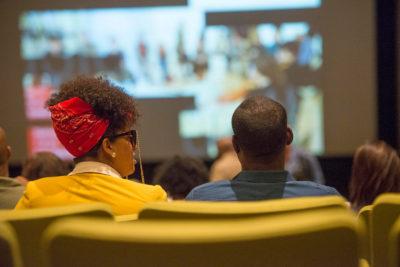
LGBTQ culture can be translated into many different forms across many different countries. Certain organizations have taken strides in introducing the Boston community to this world-wide culture, including the Museum of Fine Arts and Wicked Queer.
This past weekend, the Museum of Fine Arts, Boston and Wicked Queer, an organization in charge of the Boston LGBT Film Festival, screened a series of films with a rather specific focus in the spotlight series, “Una lengua muy poderosa: Contemporary Queer Films of Mexico.”
Each of the four films came from Mexico, and each film dealt specifically with struggles and stories from the LGBTQ community in their native country.
Wicked Queer’s film festival takes place annually in early April. The festival began in 1984, but since 1992, the Museum of Fine Arts in Boston has been the host of the event. The 2017 festival stretched across 11 days and was presented across five theaters in the greater Boston area.
Even though Wicked Queer now shows nearly 150 films each year at the festival, many still slip through the cracks. This spotlight series on contemporary queer films of Mexico is an attempt to present films that were not available for viewing at the festival.
Wicked Queer focuses on screening independent, international queer films as opposed to LGBTQ films made in America.
“We don’t have to play the West Hollywood gay comedy,” said James Nadeau, executive director of Wicked Queer. “There’s a spot for those films, and everybody needs a date night. But we tend to be more forward in thinking about the stories that aren’t being told. What are places whose stories we’ve never seen?”
He added, “There’s quite a lot of queer cinema that’s being made in Mexico at the moment, but not a lot of it comes into the United States.”
Ernesto Contreras’ film “Sueño en otro idioma (I Dream in Another Language)” was the first film in the series and screened at the MFA last Thursday. The film exemplified the type of new and untold stories that Wicked Queer attempts to highlight.
The film revolves around two elderly men living in a remote village in Mexico. The men, Don Evaristo and Don Isauro, are the last speakers of the ancient Zikril language, which was made up for creative purposes in the film.
Martín, a linguist played by Fernando Álvarez Rebeil, arrives in the village in an attempt to record and catalog the language, but there’s one slight problem: Isauro and Evaristo refuse to talk to one another.
The film, which, after its premiere at Sundance Film Festival won the Sundance Institute Mahindra Global Filmmaking Award, asks poignant questions about language, culture and love.
“I think the value of this film is the same as the value of world cinema,” said attendee Rijul Kochhar, 28, of Cambridge. “[It’s] an investigation into the hearts and desires and minds of those separated from us by geography and language but conjoined by passions.”
In their attempt to reconcile, Isauro and Evaristo bring with them years of baggage and unresolved issues, and the film doesn’t ignore this. Despite containing its fair share of mystical and fantastical elements, “I Dream in Another Language” grounds itself in real, tangible issues.
These are the issues that the staff at Wicked Queer feel are important to highlight.
Nadeau said he believes these foreign films can serve as a “wakeup call” to remind American watchers that not everybody has it so lucky.
“You might live with your husband and your kids in Newton in the suburbs and have a very lovely life, but that’s not everybody,” he said.
Andrea Caceres, 33, of Roxbury, expressed a similar sentiment regarding “I Dream in Another Language.”
“This film remarkably explores queerness outside of the dominant and ever-present Western, Urban, White, and Eurocentric narratives,” Caceres said.
The MFA and Wicked Queer screened three more contemporary queer films from Mexican filmmakers over the rest of the weekend, including the crime-filled “I Promise You Anarchy” and “Casa Roshell,” which was featured at the Berlin Film Festival.
Molly Monet-Viera, a Spanish lecturer in BU’s College of Arts and Sciences, emphasized the importance of fresh and foreign stories. In her class on Spanish-language films, Monet-Viera said she encourages her students to expose themselves to these non-American narratives.
“It’s sort of the same reason why I’m a language teacher,” Monet-Viera said. “Americans need exposure to more cultures and more languages.”
Because English is such a widely-used language, it’s easy for many people in the United States to get by without learning any new languages, she said. But, she added, that has to change.
“I think we lose out if we just focus on our own cultural production,” Monet-Viera said. “Hollywood is huge, and our films are everywhere. They are shown in all countries. But it’s important for the opposite to happen as well and for us to see cultural production from other countries.”
Nadeau recounted how, after the election of President Donald Trump, Wicked Queer made a calculated decision to become more political with their choices. He said it’s why films from Mexico were chosen in the first place.
“I think it’s important to remind people that there are queer people of color,” Nadeau said. “There are queer people from Mexico. There are queer people who are undocumented. I think [foreign queer films] are an important reminder that the struggles never really end.”















































































































